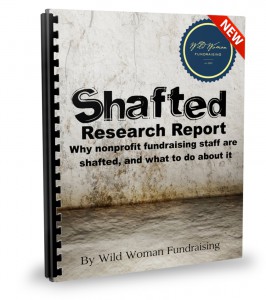Does Your Organization Really Support Fundraising? Take This Simple Quiz
Many organizations pay lip service to supporting their fundraising team, but end up failing miserably.
Your board, your executive director, and your program and admin staff can undercut fundraising efforts easily.
And in many organizations it’s happening all the time.
And why are development directors fired or leaving their jobs so often? (under two years!)
- Because they are given impossible goals, not based on any reality or a thoughtful plan.
- Because there is little to work with.
- Because they are under enormous pressure for results.
AND (maybe most of all)
- Because attitudes inside the organization undermine their work.
Take this simple quiz to see if YOUR organization has a supportive culture of philanthropy:
1. Do your board and executive director understand how fundraising really works?
Or are they among the “we must have money now and why aren’t you bringing it in” crowd?
Do they know that it takes time, consistency and investment?
Receive expert advice. Direct to your inbox. Subscribe
Much of the work I do in board retreats is simply educating board members and executive leaders about fundraising. They are usually smart people, but they just don’t understand what it takes to be successful in fundraising.
What can you do?
Spend time simply educating your leaders about fundraising. Calm them down. Make it fun. Give them easy jobs.
You can send them blog articles if they fit, such as Top 10 Things to Understand About How Fundraising Really Works Today, or The Fundraiser’s Kiss of Death, or Why You Should Ditch Your Next Event, or one of my favs: What’s the Math? 3 Questions Your Board Really Needs to Know.
Have education sessions with your board and on fundraising topics. Get your ED to sit in. Board members love “education,” they hate “training.”
2. Do the program and back office staffers understand and support fundraising?
Or do they make underhanded comments about when a fundraiser comes and goes?
This is more destructive and pervasive than you think.
I have a fundraising friend who right now has program staff openly criticizing the investment in hiring a major gifts officer (my friend). Let’s place bets at how long my friend will survive there.
Find out how we can help you achieve your fundraising goals with world-class consulting and custom training.
What can you do?
- Try different ways to get them on your team.
- Tell the admin staff that you have a goal to be out of the office 20% of your time and you need to make 20 donor visits a month. Ask for their help in who you should be visiting.
- Share success stories with them.
- In staff meetings, outline all the donor visits you are making and the potential you see.
Back office staff are important members of the fundraising team: they need to know how to recognize and handle potential donors.
Former AFP Board Chair Andrea McManus says customer service and internal cooperation are essential!
3. Does your organization have a long term commitment to fundraising over time?
This means:
- keeping the development office fully staffed
- making sure the back office and infrastructure are working smoothly
Many recent studies show that leaving the development position open can destroy a fundraising program quickly.
Because what happens? Donors don’t hear from you.. The database is not updated and you misspell your donors’ names. And on and on in a sad cycle heading downhill. Then your donors are gone.
Consistency is everything.
4. Do your organization’s leaders consider fundraising expense to be an “unfortunate cost” rather than an “essential investment.”
Bet you’d agree with me on this!
One of the most important things we can do is keep trying to educate leaders about fundraising as an investment that pays a significant return. It takes time and repeated reminders.
What you can do?
Be the squeaky wheel talking in terms of investment and ROI. You’ll gradually change their attitudes.
5. Are there “old-school” attitudes of sexism rumbling around your organization?
We hire young women, don’t pay them much, don’t give them any support, and then we can blame them when it doesn’t work.
What?
Nobody wants to talk out loud about this, but I see it everywhere. The junior fundraising staff are younger women. Many executives are men. Many board members are older men.
There is this patronizing “talking down” that goes on – “we know better than you, young lady.”
“We can’t see you as a professional. We really don’t care if you work yourself to death while we don’t support you.”
What can you do?
Conduct and dress yourself professionally.
Develop cordial relationships with these leaders. If they know you as a person they are more likely to honor and respect your opinion.
6. Are nonprofit staff at the table when the budget is set?
Are they allowed to tell board and senior leaders what is and isn’t realistic, without sounding like they’re whining?
Mazarine Treyz says,
“If they are not listened to, if they cannot set their own budget or have input on the organizational budget, they will be trapped in an impossible situation with unrealistic expectations that they have no hope of overcoming.”
You simply MUST check out Mazarine’s brand new report: “Shafted: Why Nonprofit Fundraising Staff are Shafted and What To Do About It.”
What can you do?
Figure out a way to get to the table. Don’t be afraid to be pushy. Don’t be afraid to stand up for what you know is true. What do you really have to lose?
There are a lot more questions I’d like to ask today but I’ll stop here.
BOTTOM LINE:
The context your organization is setting up for fundraising is AS IMPORTANT as the actual work of fundraising. It may be MORE important.
Send this article to your leaders and ask:
“What’s your impression of these ideas?”
And see if you can start a very important discussion!
Creating a Culture of Philanthropy at Your Nonprofit: How to Nurture and Support Fundraising in Your Organization
If you’d like more help in establishing a supportive culture for fundraising at YOUR organization, join the very smart Alice Ferris and me next Wednesday for our Master Class, July 24, for a deeper dive.
We’re gonna talk in detail about how you can smoothly, gently change attitudes, get more people on your team supporting fundraising so you can be much more successful.
This could be the most important class I’m holding all year – because this UNDERGIRDS every single thing we fundraisers do.
If we don’t have the internal support in place, how on earth can we be successful?
Join us and join the conversation. Learn some smart tools to help you get the support you need and deserve!
Find out more about Wednesday’s webinar here:
AND
Hurray, I just found out that we will be giving CFRE credits for this Master Class! Yayyyy!
LEAVE ME A COMMENT!







